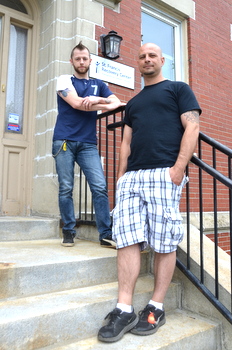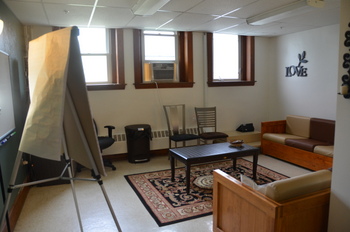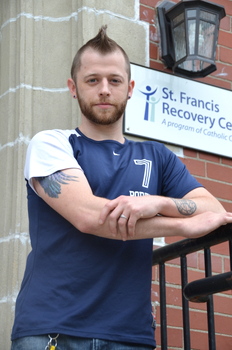Healing the body, mind, and spirit
.JPG)
Bernie L. remembers a time in his life when he was dependent on alcohol. He says he started drinking with his father and by the age of 20 was drinking every day. As the years passed, his life spiraled downward.
“They called me an ‘unrehabilitable drunk’” he says. “They didn’t want me out on the street because they knew I was going to get drunk.”
Bernie, who was living in Waterville at the time, was sent to Lewiston/Auburn to receive treatment through a program run by Catholic Charities Maine. He says it was there that what was thought to be impossible was accomplished.
“It taught me that there is life beyond drinking, that I can enjoy life. I can have a life. It taught me how to do it without alcohol,” he says. “When you’re in complete despair, and everything is gone, and somebody shows you how to live and be a productive individual, it’s important.”
Bernie says he still takes life one day a time, but those days have added up to 18 years. Two years after he completed the program, he returned, not as the result of a relapse but because of a desire to assist others. He has now worked in the kitchen at Saint Francis Recovery Center for 16 years, cooking meals and teaching current residents, like Scott and Alexander to do the same.
.JPG)
“I’m just putting the pieces together right now, but it’s manageable, much more manageable,” says Alexander, who says he suffers from bipolar disorder with hypomania and began taking drugs to self-medicate.
Saint Francis Recovery Center, located in a former convent in Auburn, offers services for men aged 18 and older who are struggling with chemical dependencies and substance abuse issues, including drug and alcohol addiction and co-occurring use disorders. It also offers outpatient services for both men and women.
The center is celebrating 40 years of service. It first opened as the Fellowship House on Saint Patrick’s Day in 1975. The house originally offered a medical detox program to assist people going through withdrawal. In 1984, a halfway house was added to provide continued treatment. In 1997, however, the state decided to shift funding from medical detox to social detox programs. The move led Catholic Charities to turn the house into an extended shelter for those awaiting longer term care. Wanting to be more than a holding facility, however, a treatment program was developed. It evolved into the residential rehabilitation and outpatient services now offered at Saint Francis Recovery Center.
Through its 45-day residential treatment program, the center aims to help men understand addiction and to teach them the skills they need to live without substances.
.JPG)
“It’s starting that process,” adds Carolee Lindsey, the director of Co-occurring and Substance Abuse Services. “There is an old saying in the 12-step program: if it took you 20 years to get into the woods, it’s going to take you at least half that time to get out of the woods. I really like to think about it from the perspective of what the brain does. What we know about neurobiology today is that whatever gets fired in the brain gets wired in the brain, and you have these dendrites that just grow and grow and grow. It’s akin to us talking about how habits develop. It’s developing new habits because it’s going to be easier to keep doing the old ones than doing something different. So, what we really try to do is to start the engine, start the process of those dendrities growing in another direction and developing new habits of the brain and habits of the body.”
.JPG)
“It’s very much life changing. We try to provide them with some skills on how to live. How do you make your bed? How do you wash your clothes? How do your cook your food? Because they don’t have it. If you’re in an addictive environment, and you’re always high, you don’t know how to do these things,” says Janine.
“It’s also how to get back in touch with your values, and how do you align your behaviors in the direction of your values? How do you manage difficult situations? How do you do effective problem solving? How do you have more insight and awareness in terms of who you are and how you impact other people?” says Carolee.
In addition to counseling sessions, the men have assigned chores which rotate on a two-week basis. They are also taken to Alcoholics Anonymous or Narcotics Anonymous sessions.
“We keep them on a schedule. We try to not give them too much time to be in their own heads, thinking all those thoughts -- some of them are good, and some of them not so good,” says Janine.
Although there is free time, there is not alone time. The center operates on the buddy system. If someone, for instance, wants to take a walk, someone must accompany them.
“They can’t go anywhere by themselves,” says Janine. “Alcohol and drugs are everywhere. You’re not going to get away from it.”
Although the men are allowed to make telephone calls, particularly to make arrangements for when they leave the center, they are not allowed to have personal cell phones.
“We don’t want them to be spending time on the Internet,” says Carolee. “The whole point is to remove yourself from the environment that kept you stimulated.”
The Saint Francis Recovery Center takes referrals from just about anywhere, including doctors’ offices, hospital detox programs, employers, family members, and the corrections system. The center has a contract with Androscoggin County Drug Court, and many referrals come from the court or from probation.
That was the case with Scott M. and Alexander R., roommates at the center.

Scott says he welcomed the opportunity, viewing Saint Francis Recovery Center as a chance to turn his life around.
“I had been trying hard at recovery, even though I kept going back out,” he says. “I felt blessed to have the opportunity, and I was happy to come.”
He describes Saint Francis as an awesome environment. He says being in a setting where drugs aren’t available has been one of the key differences.
“I think the biggest part of that was that I was trying to get away with things out there – using, maybe planning on using. And in here, I’m kind of safe from drugs, and I’ve got nothing to hide.”
He says he also appreciates the outside connection with Alcoholics Anonymous.
“I really think them taking us out into the community, as a group, to AA meetings has just been awesome because the community there has welcomed us. They want to help us, want us to do well.”

“I’ve been through a lot of counseling before, but I’ve never really been honest with my counselors, but I have been here. I’m really comfortable in all the sessions, and it’s been really helpful.”
Alexander, age 29, says the one-on-one counseling has been the most beneficial to him.
“The counselors here are very personable, and you feel comfortable with them enough to actually open up,” he says.
Alexander says he is bipolar with hypomania, which led to addiction and crime. He says he started using drugs when he was 16 years old.
“I spent most of my life treating that by myself, which is how I got into heroin and OxyContin and other substances like amphetamines and whatnot, just to regulate my moods. I did that for 13 years,” he says.
He says he hacked into a hospital’s computer to forge prescriptions, which led to incarceration. When he was released, he tried to avoid falling back into drugs but failed.
“I went back to doing everything I normally did. It got pretty bad.”

“I found that, because I was using for such a long duration, I kind of lost touch with who I actually am. Then, the whole realization of why I was even using drugs in the first place kind of kicked me while I was down, and now, I’m just battling to get my whole mental health back together,” he says. “I’m just putting the pieces back together now, but it’s more manageable, much more manageable.”
Both Scott and Alexander say they know it won’t be easy.
“I’ll be an outpatient through Catholic Charities. I’m also going to a sober house,” says Scott. “I honestly think it is the emphasis on working a 12-step program. I think that is going to be my best chance.”
“It’s going to be the never-ending struggle for the rest of my life because, scientifically, it’s a chemical imbalance in my brain that I’m going to have to deal with,” says Alexander.
He says, for him, it comes to down to three things: “I’m going to use the buzz words: willingness, open-mindedness, mindfulness.”
Three things, he says, he has embraced. “Absolutely…especially the willingness,” he says. “For me, it’s all about the baby steps.”
.JPG)
“As the problem of drug abuse has worsened, we have, sort of, failed in our state, in our society, to match that with the services that are needed,” says Carolee.
“We’ve seen the age trend downward and substances trend up actually. The chemicals are very different out there today. We still see alcohol. It is still pretty prevalent, but the opiates really are more prevalent now,” says Janine.
They say the rise in opiate use can be directly traced to the overprescribing of painkillers such as Oxycodone, OxyContin, and Vicodin 10 or 15 years ago.
“That’s the scourge of the problem escalating today. We really can directly relate them to the prescribing practices then and kids finding them on the shelf in the bathroom. These are medications that have a legitimate use. They just were prescribed in ways that people didn’t understand the power of them,” says Janine.
Now, prescription practices are much tighter, and there is a prescription monitoring program linking pharmacies to prevent abuse. However, Carolee and Janine say the problem had already taken hold.
“The cat was already out of the bag, so the vacuum was created for the introduction of more heroin,” says Carolee.
“Because, if they can’t get the substances that they are addicted to, Oxys, they’ll go to heroin,” says Janine.
“Which will behave in the same way in the brain,” explains Carolee.
Janine and Carolee say while the center helps put men on the right path, much of the work is still up to them.
.JPG)
“The catch is that we can help them start on the road of developing these habits of body, spirit, and mind, but they have to continue to do that if they’re going to be successful,” says Carolee.
“Do we see people again? Yes. We do take them back because who are we to judge whether this is going to be the one time it is going to work,” says Janine.
And while not everyone is able to break free of their addiction, there are many success stories.
“We have people who come back and will bring donations saying, ‘You guys helped me a lot. I want to give something back,’” says Janine.
They include people like Bernie.
“It taught me how to live again,” he says. “Everybody, no matter how bad they are or what they did, there is a good side to everybody in this world, and that’s what we’re looking to find here.”










